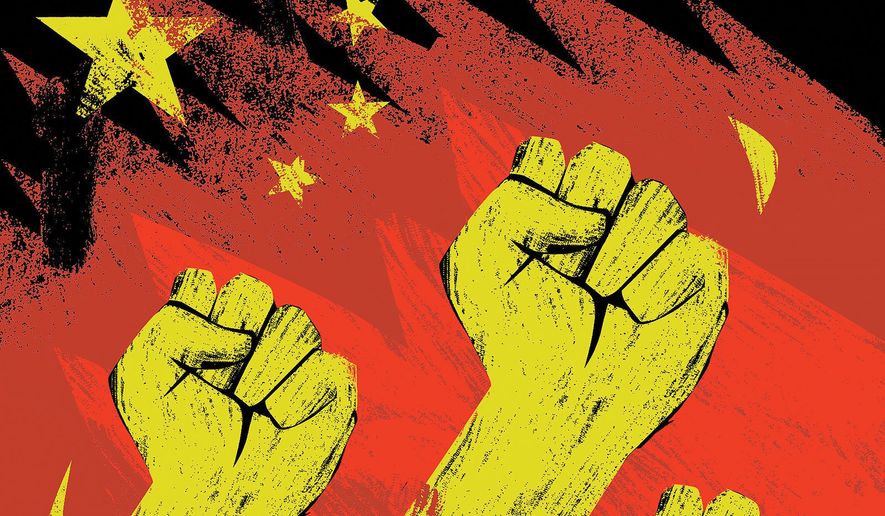OPINION:
The Chinese have taken to the streets in several major cities to protest tyrannical COVID-19 restrictions that have kept some people locked up for months. The protests, however, were not just directed against those restrictions, but also feature the Chinese calling for democracy, including the end to the tenures of leader Xi Jinping and the Chinese Communist Party.
One crowd chanted: “Don’t want dictatorship, want democracy!” Seemingly, the dictatorship of Mr. Jinping, crowned this fall when he extended his term of office indefinitely, will face resistance in the future.
Since China violently suppressed widespread pro-democracy protests in 1989, punctuated by the Tiananmen Square massacre, the free world has debated to what extent China’s government really speaks for its people. Those eager to do business with China presumed that it did. We now have another indication that it does not.
As usual, the Biden administration has been caught off guard without a policy to advance U.S. interests. The White House offered a bland statement about the right to protest peacefully and couldn’t even bring itself to condemn China’s COVID-19 lockdown policies. Completely absent were the notions that America can at least speak with a clear moral voice and that trouble at home for the Chinese Communist Party can be beneficial to America, especially to the extent it preoccupies our chief adversary in the world.
Instead, as some Chinese risk everything, the administration’s priority is to engage China in talks about climate change. This failure to grasp real priorities, which is also demonstrated by the administration’s inability to say much of anything about pro-democracy protests in Iran, reveals a recurrent pattern of U.S. foreign policy neither understanding nor supporting political actions abroad that can degrade the threat posed by our adversaries.
The Biden administration has no clear China policy, and America’s practice of political warfare against our enemies, so effective from the issuance of the Declaration of Independence, in World War II, and during the early and late Cold War, is faltering. President Biden is reminiscent of former President Lyndon Johnson, who sat mute as protesters took to the streets in 1968 in the Prague Spring in Czechoslovakia. The Soviet Union eventually sent troops to crush the uprising, which, had it succeeded, could have ended the Cold War two decades early. We’ll never know if more decisive U.S. action could have influenced the situation, because Johnson didn’t try, preferring instead to seek a pathetic arms control treaty with Moscow.
What can be done today in China? Congress and the White House should give clear and unequivocal moral support to the protesters. We and our allies should tell Beijing that a crackdown on peaceful protesters will be met with broad condemnation and an end to collaboration on other matters. Mr. Biden should say clearly that while we must at times deal with the government in Beijing, we support those Chinese who want democracy in China.
Going further, we should try to make available practical tools for Chinese dissident leaders to speak to their compatriots without censorship. In the past, U.S. political warfare activities aimed at communists included broadcasting the Voice of America into repressive areas or delivering fax machines to dissidents behind the Iron Curtain. Those tools are obsolete today, but we can field updated hardware and software plus the techniques and knowledge necessary to evade censorship. We are confident that freedom and liberty can out-innovate a repressive government in the long term.
We should also challenge China through military deterrence and nonviolent economic, political and cultural confrontation. Increasing our military presence in the Western Pacific — something successive administrations of both parties have promised but failed to execute — would give China’s military something to worry about other than enslaving its own people.
Mr. Biden should elevate the cases of dissidents in China, including imprisoned figures like Jimmy Lai, who is among 47 Hong Kong residents persecuted for pro-democracy actions.
The White House should announce strategic decoupling from China in which we get serious about efforts to end our economic dependence.
Finally, when we deal with the Chinese Communist Party, we must never presume they speak for the Chinese people. It should be clear throughout the U.S. government that we share the ultimate goal of the protesters in China, just as we sided with those who struggled against Soviet Bloc communism in the past century.
In the near term, protesters in China face long odds. In the long term, the Chinese Communist Party might face longer odds of survival if our government and the rest of the free world get serious.
• Stephen Yates was a deputy national security adviser in the George W. Bush administration and is chair of the China Policy Initiative at the America First Policy Institute. Christian Whiton was a State Department senior adviser in the Bush and Trump administrations, and is the author of “Smart Power: Between Diplomacy and War.”




Please read our comment policy before commenting.